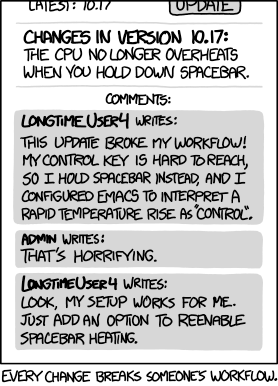Up until including Libreoffice version 24.2
Next to REM and ’ as comments indicators # worked as well
Unfortunately, since working with diverse code languages for other packages, I accidentality used # as comment indicator just 1 up to 3 times per workbook in about 2000 (out of 4000) workbooks since 2015 which I sometimes use to analyse historical financial data stored in these workbooks.
When I load these workbooks with LibreOffice 24.8 it causes many error messages during opening.
These errors end in the Basic IDE and indicate fortunately each time #debug as the cause.
For example in a Sub like this;
Function nInRange( aRange as Array, Value as Variant ) as Long
#debug msgbox LBound( aRange,1)
#debug w=LBound( aRange,1) x=UBound( aRange,1) y=LBound( aRange,2) z=UBound( aRange,2)
nInRange=-1
For h=LBound( aRange,1) to UBound( aRange,1)
For i=LBound( aRange,2) to UBound( aRange,2)
if aRange(1,i)=Value then
nInRange=i
h=UBound(aRange,1)
i=UBound(aRange,2)
End If
Next
Next h
End Function
How can I change in these 2000 files the #debug into 'debug (or into REM debug) by a command-line in linux?
Or change a setting in Libreoffice Calc 24.8 to still accept the # as comments indicator?





